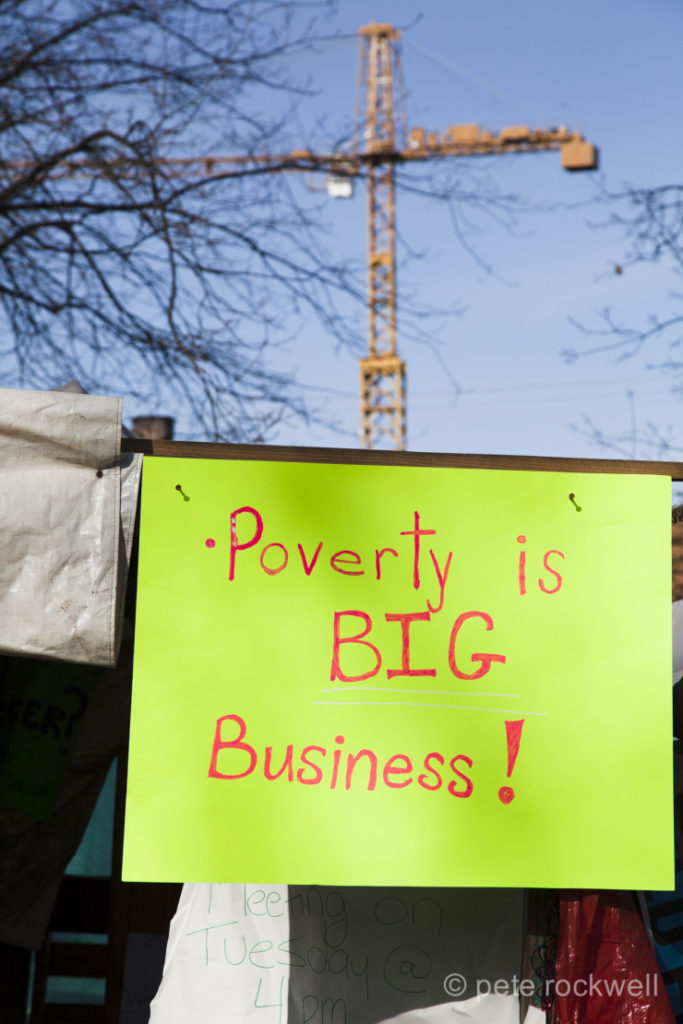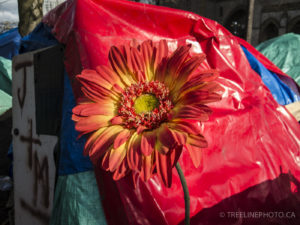
Reflections on housing justice activism in British Columbia
 I’ve been thinking a lot in the past couple days about the opportunity to engage in discussion about what we are fighting for and what we believe about what it would take to ensure that everyone has a safe, decent, affordable home. These are important discussions.
I’ve been thinking a lot in the past couple days about the opportunity to engage in discussion about what we are fighting for and what we believe about what it would take to ensure that everyone has a safe, decent, affordable home. These are important discussions.
My experience is not in government policy, law, or economics. I can’t pretend to be expert on any of these things or to know what from within the system would be most effective or most politically pragmatic.
What I know from activism is that there are contradictions at every turn in trying to get the system to do things differently, because the worlds of policy, law and economics all share the same rotten foundation. There are definitely things needed in the short-term to reduce the harm being done right now and stop people from dying. But fundamentally these emergency measures don’t transform how we are with the land and each other. Without that transformation I don’t know that we’ll ever get close to ending homelessness.
I am not inspired by any of the current options available for providing housing to people, whether by government or the private market. Neither recognize how material resources have accumulated through the exploitation of Indigenous, poor and working class peoples, and the need for a radical restructuring of resource distribution, power and control. Calling for more social housing reinforces settler state jurisdiction on stolen land, and can result in warehousing or coercive ‘supportive’ housing that robs people of their autonomy and dignity and institutionalizes people. Trying to amp up options for people in the private market reinforces housing as a commodity, legitimizes land theft, makes rich people richer, and gives land owners, property managers, and others in the housing industry significant power over other people’s lives and Indigenous peoples’ lands and resources. It’s all fucked.
 So, I don’t really know how to take that understanding into a political fight, or a platform for a national housing strategy. I keep coming back to what it would take to actually transform how we understand home, how we care about the place we live, how we learn to treat each other with respect and ensure that everyone has what they need including a safe place to live. Part of what I’m so inspired by with tent cities, squats, no-rent housing shares, and other similar grassroots initiatives is that they don’t ask the state for a solution, they rely on ordinary people to come together to simultaneously meet immediate survival needs and also collectively work on figuring out how to be in right relationship with these lands and with one another. In some communities the task really is to build more housing. In cities like Victoria, the problem isn’t that there isn’t enough material structure to house everyone, it’s that rich people take more than what they need. Somehow we have to be able to find a way to talk honestly about that and come together as communities to completely change our relationship to everything. And, I have no idea how to make that a conversation that people are actually willing to have, because it requires giving up a lot of comfort and privilege and being willing to really deal with the situation we’re in, which is quite grim; and to start loving each other fiercely and deeply and really give a shit about each other, which is super scary.
So, I don’t really know how to take that understanding into a political fight, or a platform for a national housing strategy. I keep coming back to what it would take to actually transform how we understand home, how we care about the place we live, how we learn to treat each other with respect and ensure that everyone has what they need including a safe place to live. Part of what I’m so inspired by with tent cities, squats, no-rent housing shares, and other similar grassroots initiatives is that they don’t ask the state for a solution, they rely on ordinary people to come together to simultaneously meet immediate survival needs and also collectively work on figuring out how to be in right relationship with these lands and with one another. In some communities the task really is to build more housing. In cities like Victoria, the problem isn’t that there isn’t enough material structure to house everyone, it’s that rich people take more than what they need. Somehow we have to be able to find a way to talk honestly about that and come together as communities to completely change our relationship to everything. And, I have no idea how to make that a conversation that people are actually willing to have, because it requires giving up a lot of comfort and privilege and being willing to really deal with the situation we’re in, which is quite grim; and to start loving each other fiercely and deeply and really give a shit about each other, which is super scary.
I’ve written this to remind myself that there may be points of divergence in how we understand the housing crisis and what its roots are, and that’s not really about economic and political arguments for or against rent supplements/housing allowances, it’s about something deeper and bigger that is much more nebulous and way harder to articulate. If nothing else writing it out helps me think it through a bit more, and that is helpful, so thank you for that.
